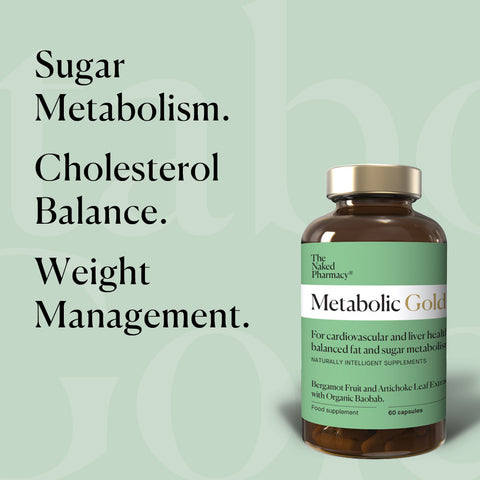Artichoke Leaf
At The Naked Pharmacy, we ensure that all of our supplements are made with effective strength bioactives, so they are clinically proven to work.
We aim for each supplement to be scientifically supported by multiple randomised placebo-controlled studies. All clinical trial studies we use to support our supplements are undertaken on human patients, using the exact same dosage and formulation of the product. The scientific studies are published in peer review journals.
What Can Artichoke Leaf Extract do for you?
Research is now showing that Artichoke Leaf Extract is a safe and effective natural supplement which has been clinically proven to help balance cholesterol and sugar levels.
Cynarin, the bioactive in artichoke leaf extract, is most effective at a concentration of 5% so that’s what you’ll find in our supplement, Metabolic Gold. Research shows that cynarin is effective in stimulating bile acid production which will lead to lower cholesterol levels, accelerating gut movement and improving the digestion of certain fats. Cynarin has also been proven to modulate the activity of the enzyme, alpha-glucosidase, which helps with sugar metabolism and also demonstrates significant liver protective and regenerating effects.If you’d like for more information on the available evidence which details and supports the efficacy of artichoke leaf extract, follow the links below.
The Studies
The scientific studies to support our claims on artichoke leaf extract are published in the following peer review journals:
AIM: To investigate whether a new highly standardised artichoke leaf extract (Cynara scolymus) could improve glycemic control, insulin sensitivity and other metabolic parameters (total cholesterol (TC), low-density lipoprotein-cholesterol (LDL-C), high-density lipoprotein-cholesterol (HDL-C) Triglycerides and waist circumference in overweight subjects with newly diagnosed impaired fasting glucose (IFG).
CONCLUSION: Artichoke leaf extract supplementation had a significant effect on metabolic parameters in impaired fasting glucose patients.
AIM: This study sought to determine if artichoke leaf extract had therapeutic utility in patients with established non-alcoholic fatty liver disease (NAFLD).
CONCLUSION: Artichoke leaf extract supplementation reduced total cholesterol, low-density lipoprotein cholesterol, high-density lipoprotein cholesterol, non-high-density lipoprotein cholesterol, and triglyceride concentrations.
AIM: The objective of this trial was to assess the effect of artichoke leaf extract on plasma lipid levels in otherwise healthy adults with mild to moderate hypercholesterolemia.
CONCLUSION: Plasma total cholesterol decreased in the treatment group by an average of 4.2% and increased in the control group by an average of 1.9%, the difference between groups being statistically significant.
Glossary of Terms
There are a few key terms to be aware of when reviewing these studies:
Randomised clinical trial: a clinical trial in which the participants are assigned randomly (by chance alone) to different treatments.
Double-blind study: a study in which neither the participants nor the experimenters know who is receiving a particular treatment. This procedure is utilised to prevent bias in research results.
Double-blind studies are particularly useful for preventing bias due to demand characteristics or the placebo effect.
Placebo: an inactive treatment used in a clinical trial, sometimes referred to as a “sugar pill.” A placebo-controlled trial compares a new treatment with a placebo, in order to give greater confidence that the result is only due to the test/active ingredient.
P-value: the probability of obtaining the observed results of a test. The lower the p-value is, the more confident we can be of a true result. For example, a p- value of 0.001 confirms a result as 99.9% accurate.







